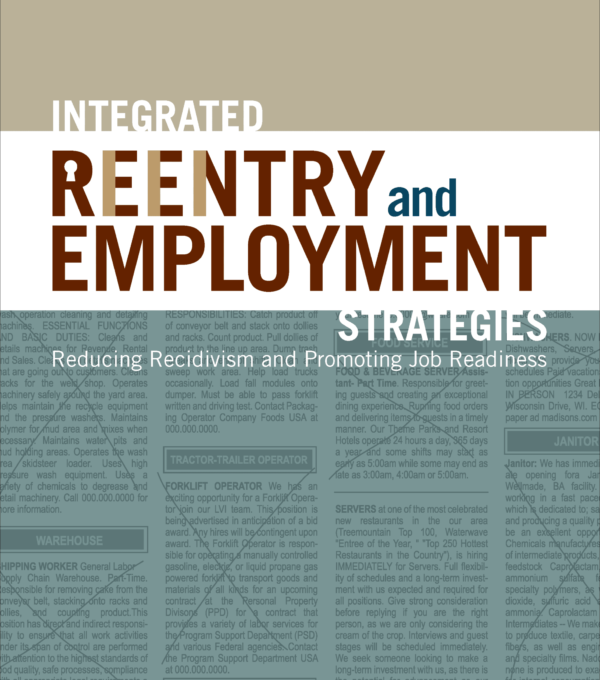Self-Assessment for Employment-Focused Reentry Programs
Measuring Fidelity to the Integrated Reentry and Employment Strategies (IRES) Framework
This self-assessment from the National Reentry Resource Center helps programs gauge their capacity to provide integrated reentry and employment interventions, including work readiness, to people with varying risks and needs. The tool helps reentry practitioners identify opportunities to build the capacity of their programming and services, which, in turn, can better prepare participants for employment and decrease their likelihood of returning to incarceration.
Finding employment is a critical part of successful reentry for the millions of people returning to communities after incarceration, but it’s not the only part. Appropriately addressing criminogenic risk and needs as well as the soft and hard skills necessary for the workplace are also key in reducing recidivism and improving long-term job retention in this population. Employment-focused reentry programs are often uniquely positioned to administer these services.
The self-assessment should be used in conjunction with the Integrated Reentry and Employment Strategies: Reducing Recidivism and Promoting Job Readiness (IRES) white paper, a resource released in 2013 that helps policymakers, practitioners, and system administrators ensure resources are being used effectively to improve employment outcomes for people who have been incarcerated or are on probation or parole.
A positive school experience, where a child feels secure, is essential for their well-being. However, for many children…
Read MoreWhen returning to their communities from criminal justice settings, people with behavioral health needs face barriers in accessing…
Read More Supporting Children of Incarcerated Parents: Reimagining School and Community Collaboration
Supporting Children of Incarcerated Parents: Reimagining School and Community Collaboration
A positive school experience, where a child feels secure, is essential for their well-being. However, for many children with incarcerated parents—one in 14 in the U.S.—school can feel far from safe due to stigma, trauma, and a lack of understanding.
Read More Assigned to the Cloud Crew: The National Incarceration Association’s Hybrid Case Management for People with Behavioral Health Needs
Assigned to the Cloud Crew: The National Incarceration Association’s Hybrid Case Management for People with Behavioral Health Needs
When returning to their communities from criminal justice settings, people with behavioral health needs face barriers in accessing basic needs—including food, housing, employment, transportation, education, clothing, and substance use and mental health services—which increases their risk of experiencing a crisis.
Read More Meet the Medicaid and Corrections Policy Academy Mentor States
Meet the Medicaid and Corrections Policy Academy Mentor States
New Hampshire Department of Corrections Commissioner Helen Hanks presents at the Medicaid and Corrections Policy Academy in-person meeting.
Read More Taking the HEAT Out of Campus Crises: A Proactive Approach to College Safety
Taking the HEAT Out of Campus Crises: A Proactive Approach to College Safety
The sharp rise in school shootings over the past 25 years has led school officials across the U.S. to take a closer look at ways to keep students safe. For Chaffey College in Rancho Cucamonga, California, a tragic incident at a nearby university hit close to home and spurred campus leaders to revisit their own school’s threat assessments and crisis responses.
Read More New Smart Supervision Resident Analyst Program to Increase Supervision Agencies’ Data Analysis Capacity
New Smart Supervision Resident Analyst Program to Increase Supervision Agencies’ Data Analysis Capacity
Ideally, leaders would have actionable data readily available to them when they need it most. However, many agencies encounter significant challenges related to procuring accurate, consistent, and timely data, often grappling with outdated systems and inadequate tools.
Read More











